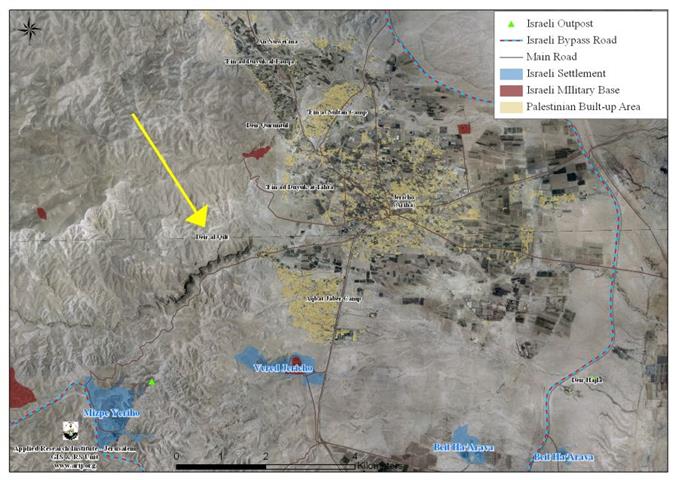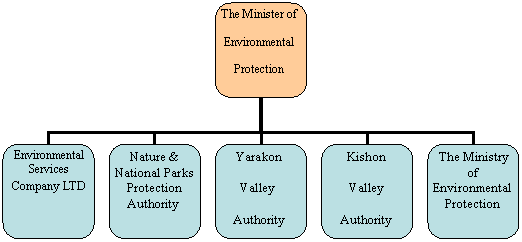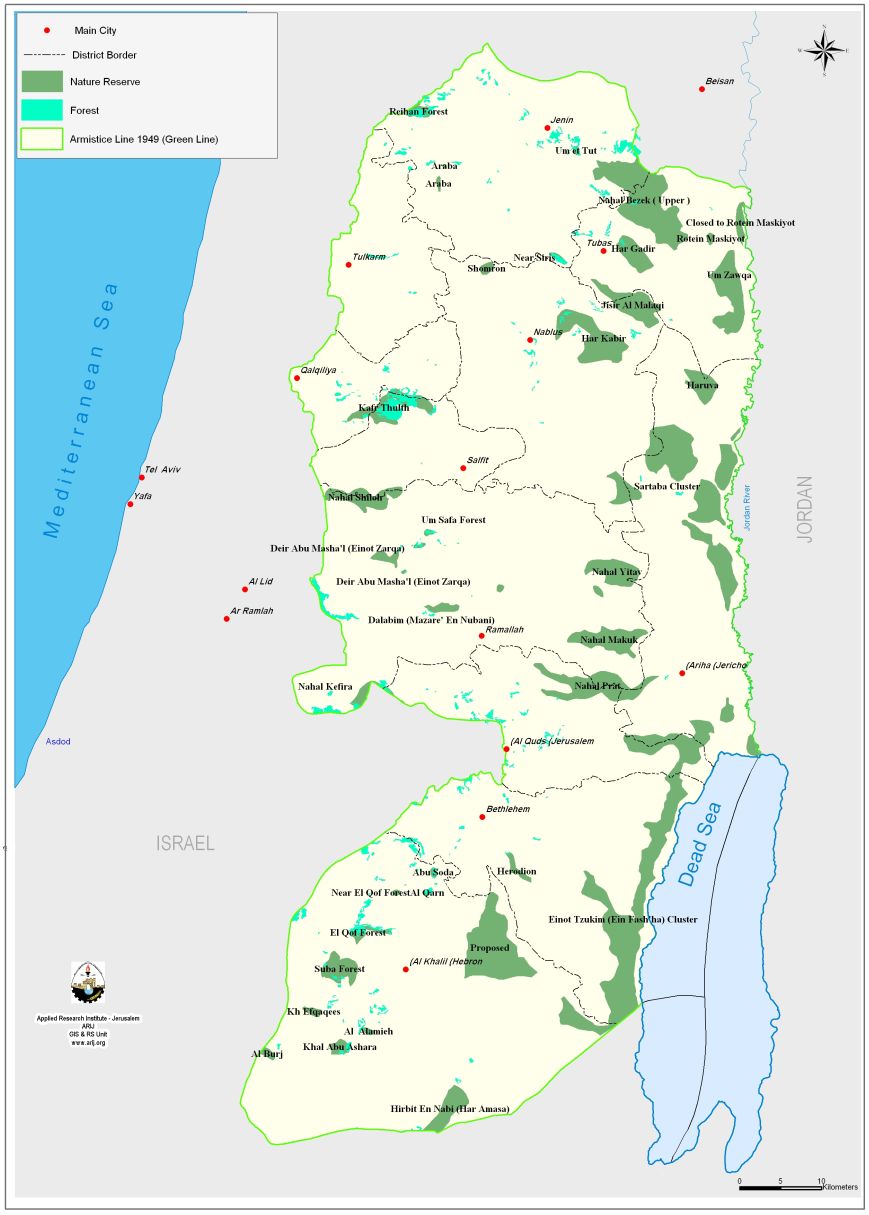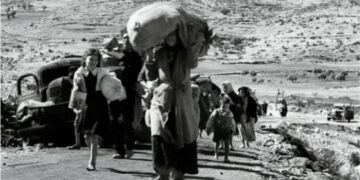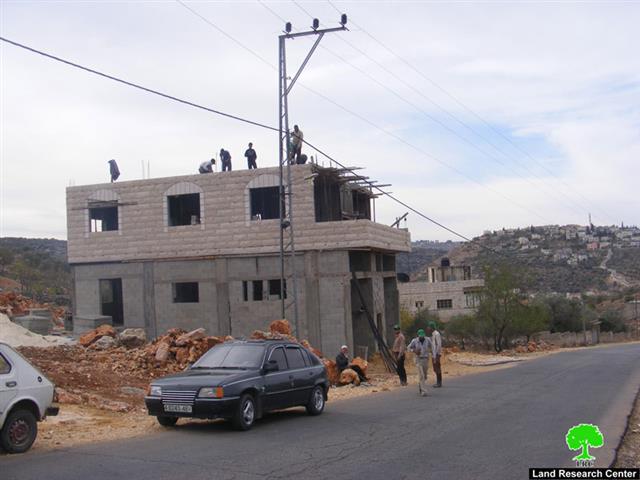It seems that Israel refuses to unshackle itself as a state from occupation, it still diligent to render its present in the occupied Palestinian territory (OPT) as natural as it possibly may do so. For some time now, the Israeli civil administration, which is the administrative branch of the Israeli Army in the OPT have been engaged in much larger activity, and the grand task of the occupation that is the Segregation Wall. More than that the conspicuous increasing settlers violence against the West Bank residents, and their confrontation with the Israeli Army forces in order to impose their will in the West Bank has turned the eyes from less conspicuous activities taking place in the West Bank, which are different in nature, more perceptive to the needs of the settlements’ program in the OPT. in this regard, the activities of the Israeli Ministry of Environmental Protection Agency and its divisions has been indirectly involved in activates that has to do much with the Israeli settlers’ sustainability in the OPT and adding more restrictions to the Palestinians' life.
1- Sewage purification station on Ofra settlement
The Israeli Ministry of Environmental Protection Agency in coordination with Samaria’s Towns (settlements) Environmental Division arranged to activate a sewage treatment station in Ofra settlement, built illegally on private Palestinians’ lands. However, the Israeli civil administration did sanction the operation of the station because of the anticipated legal problems since the station is built on private Palestinian lands. The lands confiscated to build the treatment station belong to Palestinians from the village of Deir Dibwan. Both the Israeli Ministry of Environmental Protection Agency and Samaria’s Towns (settlements) Environmental Division attributed their action to what they claimed to be an imperative step to deal with the sewage waste problem going out of the Israeli settlements onto the Palestinians’ agricultural lands.
So far, the station has not been activated, despite the fact that its construction has reached advanced stages, because it facing legal problems starting with the lack of building permits from the Civil Administration to the injunction order of the construction process.
This particular matter shed light on the other many problems resulting from the illegally built Israeli settlements throughout the OPT, where the majority of which lack any town planning scheme that relates to its surrounding environment, where the rest of the Palestinians live.
Since the establishment of Ofra settlement in 1975, the Israeli settlers discharged the untreated Wastewater from the settlement onto Palestinians' agricultural lands. Over the years, such irresponsible act has led to farmland degradation, in addition to contaminate of springs and groundwater in the region. However, every time the Israeli authorities decides to deal with the problem, to get rid of the adverse environmental effects of this waste water, the solution would usually involve confiscation of more Palestinian lands, and this time to build sewage treatment station.
What is going on with Ofra settlement is the same thing happening from many other Israeli settlements, thus the designed plan for the new treatment station would involve potential to deal with the wastewater going out of Ofra settlement and other neighboring settlements as well? According to data published by the United Nations Environmental Protection (UNEP, 2003), the average produce of solid waste of an Israelis living in West Bank settlements is 2.21 Kg/day/person. Collectively, the Israeli produce quantity that ranges between 131,000 tons/year (UNEP, 2003), and 172,000 tons/ year of solid waste (ARIJ estimate, 2005). Around 80% of the solid waste generated in Israeli settlements is dumped in sites throughout the West Bank. This figure doesn't include the significant quantity of solid waste, much of it hazardous (waste may pose a threat to human health or environment), produced in Israeli industrial areas inside the West Bank. Furthermore, the Israeli settlements in the West Bank generate a large amount of wastewater, approximately 38 MCM in the year 2003 (Isaac et al., 2003), and when comparing the waste generated by 480,000+ Israeli settlers with that generated by the 2.4 million Palestinians living in the West Bank, which 29 MCM, it is easily concluded that the settlers' wastewater generation is higher than that of the Palestinians. This can be attributed to the fact that they consume much more water for domestic purpose. Overall, only 6% of the settlements adequately treat their sewage produce in ways that conforms to treatment standards inside Israel. An additional 22% of the sewage, generated by the settlements is semi treated, leaving 72% completely untreated, thus discharged onto the Palestinians’ lands in the West Bank environment.
The Israeli settlements in the occupied Palestinian territories are environmentally unsustainable, incongruent with indigenous land use and are a source of regional conflict. The Fourth Geneva Convention of 1949, Article 49, item 6 states, 'The occupying power shall not deport or transfer part of its own civilian population into the territory it occupies.”
These settlements impose a serious threat to the sustainability of Palestinian natural resources and continue to be one of the leading causes of their degradation.
2- Preventing the access to Al-Qelt Valley
Al-Qelt valley or Wadi El -Qelt is located within the Jordan Valley, 4.26 Km southwest of Jericho, and near the Dead Sea in the West Bank. It is home to a variety of fauna including hyraxes to gazelles and also to the Greek Orthodox Monastery Saint George. Part of it was declared a nature reserve area by the Israeli Army and given the name Nahal Prat. It was visited by Israelis and Palestinians alike. See map 1.
Map 1: Location of Wadi El- Qelt Area
On November 4, 2008, the Israeli Nature & National Parks Protection Authority decided to restrict and prohibit access to Ein Mabou' in Wadi el Qelt for rehabilitation and renovation purposes. The Israeli National Parks Authority claims that it will reopen the site, which will become touristic location where the Israeli National Parks Authority will charge the visitors for entrance fees. For the Israeli, it means that they will no longer be allowed to access this site as previous and similar experiences indicates where the Israeli National Parks Authority refused to allow entrance of Palestinians to other nature reserves in Israel and in the West Bank as well. One of the sites where such policy is active is Ein Frat (near the settlement of Anatot in West Bank) where the Israeli National Parks Authority denied Palestinians access to the site, which could also happen with Palestinian visitors to Al- Qelt Valley.
The Relationship between the Israeli Ministry of Environmental protection Agency and the Nature & national parks Protection Authority in Israel.
Israel has realized since its occupation of the Palestinian territory in 1967, that it could not hold on to this territory under its control forever. With the exception of occupied East Jerusalem, which was annexed illegally and unilaterally to the state of Israel, the rest of the OPT was under the administration of the Israeli Army. On the ground, such situation became awkward for many of the Israeli ministries of the state of Israel since they have a keen interest of the West Bank resources. The Israeli Ministry of Environmental Protection Agency is one of those ministries, therefore it was imperative to circumvent such status, thus creating sub-bodies operating through the Israeli Army, which is in effective control of West Bank land and its population to carryout the Israeli ministries agenda in the OPT became possible with much more fluctuations in terms of law and thus the Nature & National Parks Protection Authority became a reality in the OPT.
The following diagram clearly shows the unmistakable ties between the Israeli Ministry of Environmental protection Agency and the Nature & national parks Protection Authority:
Source: Israeli Ministry of Environment – 2008
Resource: The Israeli Ministry of Environmental protection website
This matrix of ties and various authorities has enabled both the Israeli Ministry of Environmental protection Agency and the Nature & National Parks Protection Authority to manipulate the law and adopt a selective and double standard policy in the OPT for the Israeli settlers and the indigenous Palestinians there, particularly with regard to policies concerning the confiscation of Palestinian lands and transfer of ownerships. Today, Israel classifies more than 578582 Dunums (10+ %) of the West Bank as nature reserve and forests areas, see map 2 below.
Map 2: Nature reserves and forests areas in the West bank – classified by Israel
Source: ARIJ – GIS unit
To conclude:
Israel always finds its way to manipulate the Palestinian lives, and always finds new techniques to circumvent the international law. Nevertheless, the only remaining fact, which Israel cannot ignore or circumvent its recognized status as an occupation of the Palestinian territory.
Prepared by
The Applied Research Institute – Jerusalem


